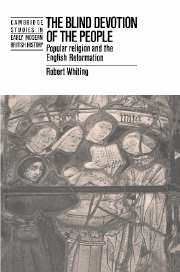Book contents
- Frontmatter
- Contents
- List of illustrations
- Preface
- Note
- 1 Introduction
- 2 Survey
- PART ONE ASSESSMENT
- 3 Dependent activities: sacraments, ceremonies and intercessions
- 4 Independent activities: prayers, images and cult objects
- 5 Inclusive institutions: parish churches, chapels and guilds
- 6 Exclusive institutions: papacy, religious orders and secular clergy
- 7 Summation of Part One
- PART TWO EXPLANATION
- Appendix 1 Maps
- Appendix 2 Graphs
- Bibliography and abbreviations
- Index
7 - Summation of Part One
Published online by Cambridge University Press: 11 December 2009
- Frontmatter
- Contents
- List of illustrations
- Preface
- Note
- 1 Introduction
- 2 Survey
- PART ONE ASSESSMENT
- 3 Dependent activities: sacraments, ceremonies and intercessions
- 4 Independent activities: prayers, images and cult objects
- 5 Inclusive institutions: parish churches, chapels and guilds
- 6 Exclusive institutions: papacy, religious orders and secular clergy
- 7 Summation of Part One
- PART TWO EXPLANATION
- Appendix 1 Maps
- Appendix 2 Graphs
- Bibliography and abbreviations
- Index
Summary
How, in brief, did the people of the South-West respond to the challenge of the Reformation?
The region has conventionally been stereotyped as remote, conservative and change-resistant. The available evidence, however, would indicate that the decline of popular support for the traditional activities and institutions was in reality both more sudden and more drastic than has usually been assumed. Until circa 1530 the overall level of this support would appear to have remained high. By 1547, nevertheless, it had already started to diminish, and in Edward's reign, in most places, it experienced a devastating collapse. Even in the favourable conditions of Mary's reign its recovery was no more than partial, and after the accession of Elizabeth it again slumped. By the 1560s, only a limited minority of the region's inhabitants could still be described as verbally, financially or actively supportive of the old religion.
The decline of popular Catholicism would seem in general to have proceeded more rapidly in the east of the region than in the west. It is possibly significant that bequests to specifically traditionalist activities and institutions appear in 43% of the Cornish wills in the years 1520–69, as against 35% of the Devonian. Certainly it was in Cornwall that insurrection was plotted in 1537, that serious rioting occurred in 1548, and that the rebellion originated in 1549, whereas in this last crisis it was Devon that seems to have provided the bulk of the region's active loyalists. Yet the contrast should not be exaggerated.
- Type
- Chapter
- Information
- The Blind Devotion of the PeoplePopular Religion and the English Reformation, pp. 145 - 148Publisher: Cambridge University PressPrint publication year: 1989



